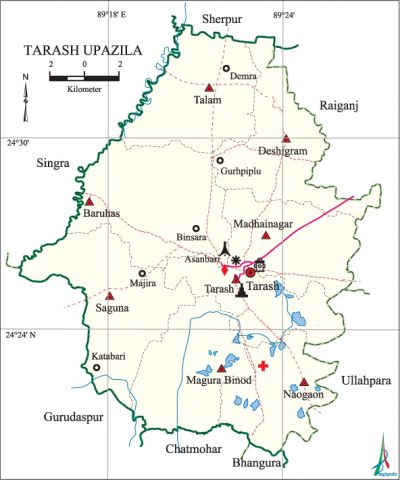Tarash Upazila
Tarash Upazila (sirajganj district) area 300.07 sq km, located in between 24°20' and 24°34' north latitudes and in between 89°15' and 89°26' east longitudes. It is bounded by sherpur (bogra) upazila on the north, bhangura and chatmohar upazilas on the south, raiganj and ullahpara upazilas on the east, gurudaspur and singra upazilas on the west.
Population Total 197214; male 97447, female 99767; Muslim 179905, Hindu 16858, Buddhist 2, Christian 198 and others 251.
Administration Tarash Thana was turned into an upazila in 1983.
| Upazila | ||||||||
| Municipality | Union | Mouza | Village | Population | Density (per sq km) | Literacy rate (%) | ||
| Urban | Rural | Urban | Rural | |||||
| - | 8 | 176 | 254 | 8442 | 188772 | 657 | 58.4 | 38.1 |
| Upazila Town | |||||
|
Area (sq km) |
Mouza |
Population |
Density (per sq km) |
Literacy rate (%) | |
| 5.10 | 1 | 8442 | 1655 | 58.4 | |
| Union | ||||
| Name of union and GO code | Area (acre) | Population | Literacy rate (%) | |
| Male | Female | |||
| Tarash 84 | 7130 | 13223 | 13416 | 44.4 |
| Talam 73 | 9408 | 11133 | 11507 | 39.6 |
| Deshigram 21 | 9325 | 10703 | 11063 | 33.6 |
| Naogaon 52 | 7572 | 13585 | 13968 | 36.9 |
| Baruhas 10 | 11981 | 13416 | 13436 | 39.0 |
| Magura Binod 42 | 9472 | 11936 | 12453 | 42.5 |
| Madhainagar 31 | 8826 | 11330 | 11811 | 37.0 |
| Saguna 63 | 10436 | 12121 | 12113 | 37.7 |
Source Bangladesh Population Census 2011,Bangladesh Bureau of Statistics.

Archaeological heritage and relics Bhagun Mosque at Nabagram (1454), Shahi Mosque at Nabagram (1526), Gadai Sarkar Mosque at Baruhas, Sanduria Jami Mosque at Tarash, Baruhas Mosque (1320),' Islampur Jami Mosque at Tarash (1802), Shiva Mandir at Tarash.
War of Liberation During the war of liberation in 1971 a battle was fought between the freedom fighters and the Pak army at Naogaon in which 130 members of the Pakistani soldiers and razakars were killed. Most notable among the encounters of freedom fighters of Tarash with the Pak army was the one at Tarash Police Station. There is a mass grave at village Asbaria of Magura union.
For details: see তাড়াশ উপজেলা, বাংলাদেশ মুক্তিযুদ্ধ জ্ঞানকোষ (Encyclopedia of Bangladesh War of Liberation), বাংলাদেশ এশিয়াটিক সোসাইটি, ঢাকা ২০২০, খণ্ড ৪।
Religious institutions Mosque 248, temple 5, church 2, tomb 1, sacred place 1.
Literacy rate and educational institutions Average literacy 35.04%; male 41.40%, female 28.56%. Educational institutions: college 5, technical college 2, secondary school 25, primary school 124, madrasa 16. Noted educational institution: Tarash Degree College (1972).
Cultural organisations Library 1, club 20, cinema hall 1, theatre stage 1, women organisation 4.
Main sources of income Agriculture 84.75%, non-agricultural labourer 1.62%, industry 0.26%, commerce 4.90%, transport and communication 0.99%, service 2.74%, construction 0.41%, religious service 0.14%, rent and remittance 0.07% and others 4.12%.
Ownership of agricultural land Landowner 64.11%, landless 35.89%; agricultural landowner: urban 58.29% and rural 64.32%.'
Main crops Paddy, wheat, mustard, maize, pulse, onion, garlic, kalai.
Extinct or nearly extinct crops Sesame, jute.
Main fruits Mango, jackfruit, guava, watermelon, papaya, banana.
Communication facilities Pucca road 115 km, semi-pucca road 12 km, mud road 441 km.
Extinct or nearly extinct traditional transport Palanquin, horse carriage, bullock cart.
Noted manufactories Ice factory.
Cottage industries Goldsmith, nakshi kantha work, chatai, bamboo and wood work.
Hats, bazars and fairs Hats and bazars are 22, fairs 3, most noted of which are Tarash Hat, Ulipur Hat, Boalia Hat, Baruhas Hat, Binshara Hat, Gulta Bazar and Behula Mela.
Main exports Paddy, rice, fish, watermelon.
Access to electricity All the unions of the upazila are under rural electrification net-work. However 40.2% of the dwelling households have access to electricity.
Sources of drinking water Tube-well 95.7%, tap 0.8% and others 3.5%.
Sanitation 66.9% of dwelling households of the upazila use sanitary latrines and 26.3% of dwelling households use non-sanitary latrines; 6.8% of households do not have latrine facilities.
Health centres Upazila health complex 1, family planning centre 7.
Natural disasters Many people were victims of the famines of 1897, 1943 and 1974. Besides, the earthquakes of 1885 and 1897 caused heavy damages to settlements and other properties of the upazila.
NGO activities Operationally important NGOs are brac, proshika, asa, World Vision. [M.G Newaz]
References Bangladesh Population Census 2001 and 2011, Bangladesh Bureau of Statistics; Cultural survey report of Tarash Upazila 2007.
